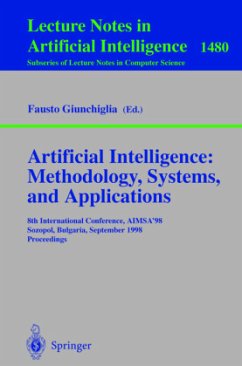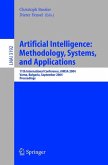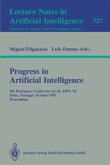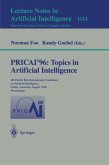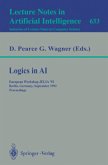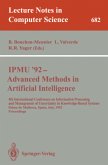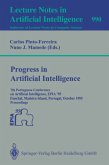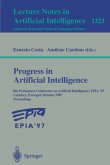Giunchiglia8th International Conference, AIMSA'98, Sozopol, Bulgaria, September 21-23, 1998, Proceedings
Artificial Intelligence: Methodology, Systems, and Applications
8th International Conference, AIMSA'98, Sozopol, Bulgaria, September 21-23, 1998, Proceedings
Mitarbeit:Giunchiglia, Fausto
Giunchiglia8th International Conference, AIMSA'98, Sozopol, Bulgaria, September 21-23, 1998, Proceedings
Artificial Intelligence: Methodology, Systems, and Applications
8th International Conference, AIMSA'98, Sozopol, Bulgaria, September 21-23, 1998, Proceedings
Mitarbeit:Giunchiglia, Fausto
- Broschiertes Buch
- Merkliste
- Auf die Merkliste
- Bewerten Bewerten
- Teilen
- Produkt teilen
- Produkterinnerung
- Produkterinnerung
This book constitutes the refereed proceedings of the 8th International Conference on Artificial Intelligence: Methodology, Systems, Applications, AIMSA'98, held in Sozopol, Bulgaria, in September 1998. The 40 revised full papers presented were carefully reviewed and selected from a total of 90 submissions. The papers address the whole spectrum of current topics in AI, in particular case-based reasoning, multi-agent systems, planning and temporal reasoning, decision procedures, inductive reasoning, abduction, constraint-based reasoning, knowledge acquisition, knowledge-based systems, learning,…mehr
Andere Kunden interessierten sich auch für
![Artificial Intelligence: Methodology, Systems, and Applications Artificial Intelligence: Methodology, Systems, and Applications]() Christoph Bussler / Dieter Fensel (eds.)Artificial Intelligence: Methodology, Systems, and Applications39,99 €
Christoph Bussler / Dieter Fensel (eds.)Artificial Intelligence: Methodology, Systems, and Applications39,99 €![Progress in Artificial Intelligence Progress in Artificial Intelligence]() FilgueirasProgress in Artificial Intelligence39,99 €
FilgueirasProgress in Artificial Intelligence39,99 €![PRICAI '96: Topics in Artificial Intelligence PRICAI '96: Topics in Artificial Intelligence]() FooPRICAI '96: Topics in Artificial Intelligence77,99 €
FooPRICAI '96: Topics in Artificial Intelligence77,99 €![Logics in AI Logics in AI]() David Pearce / Gerd Wagner (eds.)Logics in AI39,99 €
David Pearce / Gerd Wagner (eds.)Logics in AI39,99 €![IPMU'92 - Advanced Methods in Artificial Intelligence IPMU'92 - Advanced Methods in Artificial Intelligence]() Bernadette Bouchon-Meunier / Llorenc Valverde / Ronald R. Yager (eds.)IPMU'92 - Advanced Methods in Artificial Intelligence39,99 €
Bernadette Bouchon-Meunier / Llorenc Valverde / Ronald R. Yager (eds.)IPMU'92 - Advanced Methods in Artificial Intelligence39,99 €![Progress in Artificial Intelligence Progress in Artificial Intelligence]() Pinto-FerreiraProgress in Artificial Intelligence39,99 €
Pinto-FerreiraProgress in Artificial Intelligence39,99 €![Progress in Artificial Intelligence Progress in Artificial Intelligence]() CostaProgress in Artificial Intelligence39,99 €
CostaProgress in Artificial Intelligence39,99 €-
-
-
This book constitutes the refereed proceedings of the 8th International Conference on Artificial Intelligence: Methodology, Systems, Applications, AIMSA'98, held in Sozopol, Bulgaria, in September 1998.
The 40 revised full papers presented were carefully reviewed and selected from a total of 90 submissions. The papers address the whole spectrum of current topics in AI, in particular case-based reasoning, multi-agent systems, planning and temporal reasoning, decision procedures, inductive reasoning, abduction, constraint-based reasoning, knowledge acquisition, knowledge-based systems, learning, natural language processing, temporal and causal reasoning, etc.
The 40 revised full papers presented were carefully reviewed and selected from a total of 90 submissions. The papers address the whole spectrum of current topics in AI, in particular case-based reasoning, multi-agent systems, planning and temporal reasoning, decision procedures, inductive reasoning, abduction, constraint-based reasoning, knowledge acquisition, knowledge-based systems, learning, natural language processing, temporal and causal reasoning, etc.
Produktdetails
- Produktdetails
- Lecture Notes in Computer Science 1480
- Verlag: Springer / Springer Berlin Heidelberg / Springer, Berlin
- Artikelnr. des Verlages: 10638758, 978-3-540-64993-9
- 1998.
- Seitenzahl: 520
- Erscheinungstermin: 2. September 1998
- Englisch
- Abmessung: 235mm x 155mm x 28mm
- Gewicht: 666g
- ISBN-13: 9783540649939
- ISBN-10: 354064993X
- Artikelnr.: 09229088
- Herstellerkennzeichnung
- Springer-Verlag GmbH
- Tiergartenstr. 17
- 69121 Heidelberg
- ProductSafety@springernature.com
- Lecture Notes in Computer Science 1480
- Verlag: Springer / Springer Berlin Heidelberg / Springer, Berlin
- Artikelnr. des Verlages: 10638758, 978-3-540-64993-9
- 1998.
- Seitenzahl: 520
- Erscheinungstermin: 2. September 1998
- Englisch
- Abmessung: 235mm x 155mm x 28mm
- Gewicht: 666g
- ISBN-13: 9783540649939
- ISBN-10: 354064993X
- Artikelnr.: 09229088
- Herstellerkennzeichnung
- Springer-Verlag GmbH
- Tiergartenstr. 17
- 69121 Heidelberg
- ProductSafety@springernature.com
The gain of failures: Using side-effects of anaphora resolution for term consistency checks.- An agent model for NL dialog interfaces.- Constraint solving in Logic Programming and in Automated Deduction: A comparison.- An extension of SATPLAN for planning with constraints.- Reasoning about generalized intervals.- Formalizing belief reports - The approach and a case study.- Extension calculus and query answering in prioritized default logic.- Study of symmetry in qualitative temporal interval networks.- A blackboard architecture for guiding interactive proofs.- Combining nonmonotonic reasoning and belief revision: A practical approach.- Modelling uncertainty with kripke's semantics.- Using linear temporal logic to model and solve planning problems.- Tailorable interactive agents for scheduling meetings.- Planning diagonalization proofs.- Theories and proofs in fault diagnosis.- Nonmonotonic reasoning under uncertain evidence.- Multicontext systems with importing contexts.- Planning via model checking in determistic domains: Preliminary report.- Acquisition of useful lemma-knowledge in automated reasoning.- Constructing translations between individual vocabularies in multi-agent systems.- Belief reconstruction in cooperative dialogues.- Model theoretic semantics for information integration.- A classification learning algorithm robust to irrelevant features.- Knowledge assimilation and proof restoration through the addition of goals.- Learning multiple predicates.- Modal reasoning and rough set theory.- Overcoming incomplete information in NLP systems - Verb subcategorization.- A framework for inductive learning based on subsumption lattices.- Dynamic learning - An approach to forgetting in ART2 neural networks.- A new approach to linguistic negation of nuancedinformation in knowledge-based systems.- SAT-based decision procedures for normal modal logics: A theoretical framework.- Version space retraction with instance-based boundary sets.- A new abstract logic programming language and its quantifier elimination method for disjunctive logic programming.- A new approach to learning Bayesian Network classifiers from data: Using observed statistical frequencies.- Abstraction as a form of elaboration tolerance.- System architecture of a distributed expert system for the management of a national data network.- Strategy selection for automated theorem proving.- An agent system for intelligent situation assessment.- Knowledge granularity and action selection.- Towards lifetime maintenance of case base indexes for continual case based reasoning.
The gain of failures: Using side-effects of anaphora resolution for term consistency checks.- An agent model for NL dialog interfaces.- Constraint solving in Logic Programming and in Automated Deduction: A comparison.- An extension of SATPLAN for planning with constraints.- Reasoning about generalized intervals.- Formalizing belief reports - The approach and a case study.- Extension calculus and query answering in prioritized default logic.- Study of symmetry in qualitative temporal interval networks.- A blackboard architecture for guiding interactive proofs.- Combining nonmonotonic reasoning and belief revision: A practical approach.- Modelling uncertainty with kripke's semantics.- Using linear temporal logic to model and solve planning problems.- Tailorable interactive agents for scheduling meetings.- Planning diagonalization proofs.- Theories and proofs in fault diagnosis.- Nonmonotonic reasoning under uncertain evidence.- Multicontext systems with importing contexts.- Planning via model checking in determistic domains: Preliminary report.- Acquisition of useful lemma-knowledge in automated reasoning.- Constructing translations between individual vocabularies in multi-agent systems.- Belief reconstruction in cooperative dialogues.- Model theoretic semantics for information integration.- A classification learning algorithm robust to irrelevant features.- Knowledge assimilation and proof restoration through the addition of goals.- Learning multiple predicates.- Modal reasoning and rough set theory.- Overcoming incomplete information in NLP systems - Verb subcategorization.- A framework for inductive learning based on subsumption lattices.- Dynamic learning - An approach to forgetting in ART2 neural networks.- A new approach to linguistic negation of nuancedinformation in knowledge-based systems.- SAT-based decision procedures for normal modal logics: A theoretical framework.- Version space retraction with instance-based boundary sets.- A new abstract logic programming language and its quantifier elimination method for disjunctive logic programming.- A new approach to learning Bayesian Network classifiers from data: Using observed statistical frequencies.- Abstraction as a form of elaboration tolerance.- System architecture of a distributed expert system for the management of a national data network.- Strategy selection for automated theorem proving.- An agent system for intelligent situation assessment.- Knowledge granularity and action selection.- Towards lifetime maintenance of case base indexes for continual case based reasoning.

